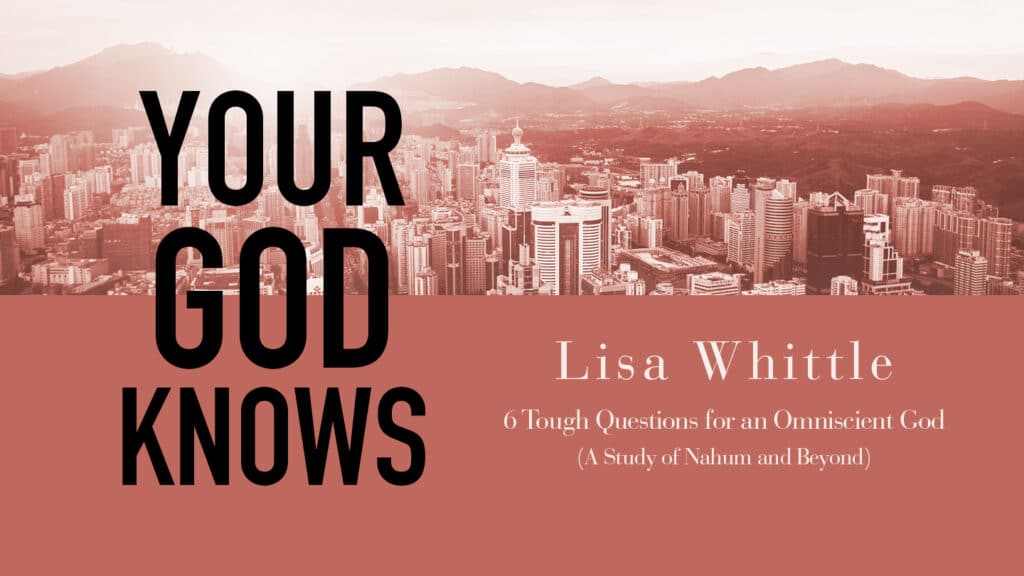The following is an excerpt from the Your God Knows Bible study by Lisa Whittle.
Every one of us has most likely experienced the feeling of being unseen, unknown, or disregarded. These are the feelings of being forgotten. They can be soul crushing, life altering, and future damaging.
There are two huge contributing factors to feeling forgotten: circumstances and culture.
Circumstances often lead you to forget who God is.
I sat in a small group circle with some women years ago. In particular, a young woman named Holly stood out to me. Raw from her difficult circumstances, her emotions were telling her God had forgotten her. Her family of five—herself, her husband, and her three small children—was displaced from their home after a massive flood in their city destroyed it and all their earthly possessions.
Having moved from hotel to hotel and then eventually being taken in by a kind family, they had been living a nomadic life, and it was wearing on Holly and her family. When I asked her what the biggest need of her heart was, she immediately said, “I feel forgotten.” Did God see her family situation? And if He did, why did she feel so abandoned? Could He even be trusted?
Reminder: Feeling forgotten is an emotional response to wanting to be seen, heard, known, valued, and loved. We all want these things. Feelings are good and normal. Our problem is when we try to tend to feelings with feelings rather than biblical truth. This is the plight of a lost society.
Believers in Jesus know a better way.
From the Old Testament to the New Testament, we find this message of God in the character of His consistency: I will never forget you. I am always with you.
Culture often leads you to forget who you are.
The truth is, culture isn’t powerful. Does it surprise you to hear me say that since it often seems like it’s beating down our faith? Based on the Word of God, culture does not hold power; God does. And even more, that power is available to us. (Read Ephesians 1 if you need to be reminded of this.)
By staying aligned with Christ, we have the power to overrule the lies culture employs which cause us to forget who we are. Lies such as:
- Rely on your feelings more heavily than on God’s Word.
- Be self-sufficient; help yourself; you’re in charge of your success.
- Trust in cues, vibes, karma, and your gut to lead you.
- Believe everything your circumstances tell you about life.
- Do whatever you want, whenever you want.
- Hold people up to your standards and discretion of fairness.

When we feel forgotten (a human emotion that happens to all of us at times!), we have a choice. We can believe WHO GOD IS based on what we know to be true about Him (more on this in a minute), resulting in becoming settled and secure. Or we can turn from Him to believe CULTURE’S INFLUENCE AND LIES, which lead us into what I call a cycle of control.
This cycle will only leave us feeling more desperate and alone. When we experience emotions that are hard, human nature will always nudge us to control the situation however we can. I’m sure the remnant in Judah wanted to control their feelings of despair in their hard situation. We all feel lost at times. We all feel forgotten.
Only God, who made us, will ever truly know us and make us feel known.
I will never forget you. I am always with you.
From the Old Testament to the New Testament, we find this message of God in the character of His consistency: I will never forget you. I am always with you.
In Deuteronomy 31, Moses gives a sweeping speech in his last days both on earth and in leadership (not bad for a man who said he wasn’t good at public speaking—Exodus 4:10). He speaks directly to his successor, Joshua, as all of Israel looks on and memorably says, “It is the LORD who goes before you. He will be with you; he will not leave you or forsake you. Do not fear or be dismayed” (v. 8 ESV).
In Matthew 28, we find Jesus having risen from the dead and appearing to Mary Magdalene and the other Mary as proof (shout-out to our Lord for the value He placed on women in His story, even in this moment!). In His final words, He gave this comforting charge: “And be sure of this: I am with you always, even to the end of the age” (v. 20b NLT).
And oh, I just have to remind us of a great story told in the Gospels about the hurting, broken woman who was looking for healing from her chronic bleeding condition. Because if anyone felt forgotten, it was her.

Read Matthew 9:20–22 to familiarize yourself with it—and keep it open.
This woman was an outcast. Imagine everyone knowing about an embarrassing medical condition you’re suffering from, especially such a personal one. Then imagine your condition prevents you from entering the temple and, further, you’re denied even physical touch from another human.
God has not forgotten you.
She was known and seen in her community but for reasons that felt labeling, marginalizing, and wounding. No one saw her as a beautiful daughter of God. So in her visibility, she was avoided, alone, uncared-for, and yes, unknown in the ways that truly mattered. And yet … God paused for her. He saw her for something else.
He sees you too.
Even in the bigger acts of His power and care, there is a tie to a personal mission—a mission involving His relationship with you, and your relationship with the world.
As God has not forgotten the world …
And God has not forgotten you …
He wants to work through you to let the world know He has not forgotten it.
How does this remembrance that you are a crucial part of God’s plan encourage you in your ministry?
©2023 Lisa Whittle. Excerpted from Your God Knows, published by David C Cook. All rights reserved. Publisher permission required to reproduce.






